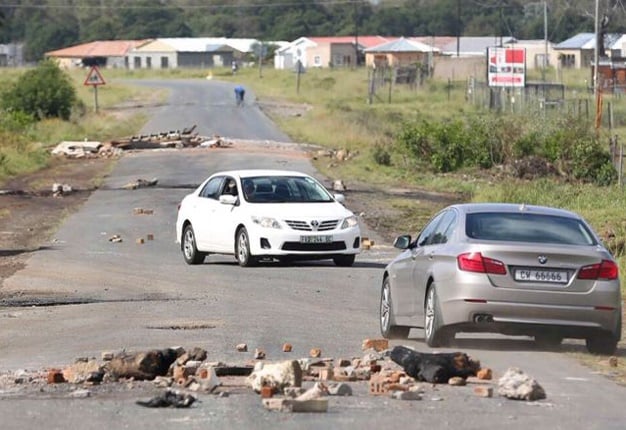
Cape Town - From violent protests on the N3 between Durban and Johannesburg which saw 23 trucks set alight due to alleged Xenophobia attacks, to service delivery protesting on the N2 near Somerset West, several road closures have taken place since the end of April 2018.
Protesters reportedly used burning tyres to block the route and police report rocks and large stones were thrown at cars.
According to News24, protesters barricaded several roads, damaged property and set a truck alight in Cape Town on Wednesday morning (May 2).
Read: Stone-throwing protesters block N2 in Cape Town
In Johannesburg, the N12 between Lenasia and the N1 near Grasmere tollgate had been re-opened following earlier protests. JMPD spokesperson Wayne Minnaar said officers had also cleared the N17 of burning tyres and rocks.
Have you been caught in any violent protest action? Email us
Arrive Alive's Johan Jonck says: "For the ordinary South African commuting to and from work by vehicle these protests and civil unrest has become a major frustration as it is something totally out of any driver's control.
"There is little that can be done except to do everything possible not to get caught up in the unrest and suffer personal and vehicle damage. Social media platforms such as Twitter and local radio stations will become increasingly important in sharing alerts of these high risk areas to avoid."
Arrive Alive has shared some insights on how to drive defensively and safely in such areas of civil unrest.
Here's a list of tips from the Automobile Association of South Africa on what to do during a protest:
What you should do:
1 Stay in your vehicle as long as possible. Make sure your windows are closed and doors locked
2 Unbuckle your seat belt, and those of any passengers, to be prepared to exit your car quickly.
3 Keep your car moving as much as possible, whilst checking for possible escape routes.
4 Do not harm any protesters with your vehicle as this may turn the mob against you.
5 Do not taunt the protesters by shouting, gesticulating or hooting at them.
6 Remain as calm as possible to ensure you are aware of what is going on around you.
7 Seek assistance or safety from the police as quickly as you can. If you do not see the police, call them.
8 Obey police instructions.
9 Leave your car only if the situation becomes life-threatening and get out of the area on foot. Your life is more valuable than your possessions.
10 Once you are safe (with or without your vehicle) contact family or friends to let them know where you are, and what is happening.
Read the original article here.
Be prepared
• Safety always starts with planning - The best way not to become part of any unrest situation is to not be there in the first place.
• If you are aware of trouble in an area and it is not essential to travel, rather delay your journey or find alternate routes.
• Monitor media and social media and listen to the local radio station for radio reports and traffic updates.
• If in doubt about the safety of an area, phone a police station in the area for advice.
• On the national tolled roads, the toll concessionaires have call centres that are operational 24/7, offering regular updates on social media platforms such as Twitter.
• Limit your trips at night or at least take someone along with you. Many of the recent incidents of public violence on our freeways have taken place under the cover of darkness.
• During daytime, there is increased visibility allowing more time and space to respond to emergencies.
• Be extra cautious when accompanied by people with special needs such as children, the elderly or a passenger who is pregnant.
Vehicle safety
• Ensure that your vehicle is in a good condition when you plan to go on a journey.
• Ensure that the fuel tank of your vehicle always has sufficient fuel.
• Always lock your vehicle's doors and keep the windows closed.
• Do not be seen using your cellular phone – Rather use a hands-free kit.
• Do not leave valuables such as handbags and briefcases within clear sight of anyone approaching your vehicle.
• Defensive and Non-Provocative Driving in Areas of Protests/ Riots
• It’s important that anyone driving in an area that may be affected by unrest understands that the SAPS will most probably have blocked off a road to prevent entry.
• Trust and obey the instructions from police and traffic officials. Don’t put yourself in any danger by disobeying them.
• If traffic has become congested – do not drive in the emergency lane thereby endangering the lives of those who may need urgent medical attention.
• Check for possible escape routes you can use‚ or for a police presence that you can approach for assistance.
• Stay in your car for as long as possible.
• Unbuckle your seatbelt‚ and those of any passengers‚ to be prepared to exit your car quickly when needed.
• Keep your car moving as far as you can‚ whilst checking for possible escape routes.
• Remember that conflict can only continue to exist with participation – the protest may have nothing to do with you - do NOT participate.
• Be vigilant always and ensure that protesters know you pose no threat and are merely trying to pass through.
• Drive defensively with the required patience for the situation.
• Pay attention to the road surface and where you drive - You do not want to get stranded with a tyre puncture or from a collision into another vehicle.
• Avoid hitting any protestors with your vehicle as this may turn the mob against you.
• Do not taunt the protestors with provocative gestures such as shouting‚ gesticulating or hooting at them.
• Remain as calm as possible to ensure you are aware of what is going on around you.
• Seek assistance or safety from the police as quickly as you can. If you do not see the police‚ call them.
• Have enough water in the vehicle to remain hydrated during travel delays.
• Become familiar with your route before you start the trip.
• Get a map of the route and study it for alternative routes and roads
• GPS devices or apps on smartphones may also provide invaluable guidance on routes for detours.




 Publications
Publications
 Partners
Partners











